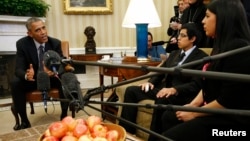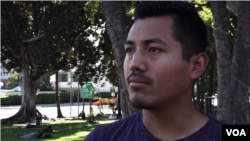White House spokesman Josh Earnest said President Barack Obama cannot use his clemency authority to legalize the immigration status of undocumented students.
Earnest said Thursday that is why the president was such a forceful advocate for legislation that would correct some of the injustices and implement some of the reform that would enhance our national security, improve the country's fiscal situation and obviously ensure that we treat people fairly."
The response came after a group of 60 Democratic House members sent a letter urging Obama to pardon Deferred Action for Childhood Arrivals recipients for the offense of being in the United States illegally, the idea being to shield them from prosecution.
The DACA program started by Obama allows certain undocumented immigrants to the United States who entered the country as minors to receive a renewable two-year period of deferred action from deportation and eligibility for a work permit. More than 740,000 people have been approved for deportation relief under the program.
President-elect Donald Trump has promised to cancel all executive actions, memoranda and orders issued by President Barack Obama affecting the protection of immigrants who were brought to the country as children. Trump has labeled them "unconstitutional."
Trying to 'achieve the American dream'
In the letter sent Wednesday, the legislators said DACA recipients, also known as dreamers, had trusted the government to protect them. But many dreamers now fear that addresses and other identifying information they provided to register for DACA can be used by the new administration to target them for deportation.
"After decades in this country young people were educated in our schools, children who have grown up with our children, who know no other country, who have pledged allegiance to our flag and now we know there are Republicans who want them deported.And their skills and talents taken to some other country," Illinois Democratic Representative Luis Gutierrez said Wednesday at a news conference.
People like Giovanni Guerrero arrived in the United States when he was seven, but his family overstayed a visa, making him and his siblings undocumented.
"I'm a proud Mexican-American but I've been here since the first grade and being raised here, you get adapted," Guerrero said.
The 20-year-old is also a DACA recipient who is a third-year aerospace engineering student concentrating in astronautics at California Poly San Luis Obispo.
"[I] know that all my efforts and dreams will be destroyed by not being allowed to enter [this] industry, especially if I am deported," he added.
During a podcast interview released by the Center for Migration Studies, White House Domestic Policy Council Director Cecilia Muñoz explained
"Pardon authority is generally designed for criminal violations not civil," she said. "... Ultimately it would not protect a single soul from deportation. It is not an answer here for this population."
Muñoz added that is why President Obama prefers legislation, "Because anything he has the capacity to do for people was by definition temporary."
New Policy Not Decided
But Trump has indicated he was "going to work something out" for undocumented youth like Guerrero.
"They got brought here at a very young age, they've worked here, they've gone to school here. Some were good students.Some have wonderful jobs. And they're in never-never land because they don't know what's going to happen," Trump said.
In a Time Magazine "Person of the Year" interview, he promised to do something to make "people happy and proud," but did not dismiss the idea of getting rid of DACA.
Meanwhile, the president-elect's transition team has also not disclosed how or if he will implement his immigration promises.
"The president-elect is very focused on naming his Cabinet, building out his administration and preparing to hit the ground running on Inauguration Day," Jason Miller, a spokesman for the Trump transition team, told Reuters. "... There will be plenty of time to discuss detailed policy specifics after the swearing-in."





